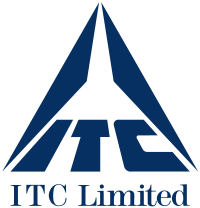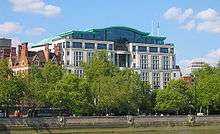ITC Limited
 | |
| Public | |
| Traded as |
BSE: 500875 NSE: ITC BSE SENSEX Constituent CNX Nifty Constituent |
| Industry | Conglomerate |
| Predecessor | W.D. & H.O. Wills . |
| Founded | 24 August 1910 (as Imperial Tobacco Company of India)[1][2] |
| Headquarters |
Virginia House, Kolkata, West Bengal, India[3] |
Area served | |
Key people |
|
| Products |
Consumer Goods (Comprising Foods, Personal Care, Cigarettes and Cigars, Apparel, Education and Stationery Products, Incense Sticks, Safety Matches) Hotels and Resorts Paperboards & Specialty Papers Packaging Agri-Business Information Technology |
| Revenue |
|
|
| |
|
| |
| Total assets |
|
Number of employees | 26,159 (2018)[5] |
| Divisions |
|
| Website |
www |
ITC Limited is an Indian company[6] headquartered in Kolkata, West Bengal. Its diversified business includes five segments: Fast-Moving Consumer Goods (comprising Foods, Personal Care, Cigarettes and Cigars, Apparel, Education and Stationery Products, Incense Sticks and Safety Matches), Hotels, Paperboards & Specialty Papers, Packaging, Agri-Business and Information Technology. Though, cigarette business contributes more than 80% of the profits of the company, 80% of the capital is invested in the non-tobacco businesses.
Established in 1910 as the 'Imperial Tobacco Company of India Limited', the company was renamed as the 'India Tobacco Company Limited' in 1970 and later to 'I.T.C. Limited' in 1974. The dots in the name were removed in September 2001 for the company to be renamed as 'ITC Limited' where 'ITC' would no longer be an acronym.The company completed 100 years in 2010 and as of 2012-13, had an annual turnover of US$8.31 billion and a market capitalization of US$50 billion. It employs over 30,000 people at more than 60 locations across India and is part of Forbes 2000 list.
History
Tobacco business and early years
ITC Limited was incorporated under the name 'Imperial Tobacco Company of India Limited', succeeding W.D. & H.O. Wills. on 24 August 1910 as a British owned company registered in Calcutta.[7] Since the company was largely based on agricultural resource, it ventured into partnerships in 1911 with farmers of southern part of India for sourcing leaf tobacco. Under the company's umbrella, the 'Indian Leaf Tobacco Development Company Limited' was formed in Guntur district of Andhra Pradesh in 1912. The first cigarette factory of the company was set up in 1913 at Bangalore. In 1918, leaf buying points were created at identified centers along South India. ITC's cigarette factory at Munger was equipped with printing facility in 1925, paving way for its first non-tobacco business.
Though the first six decades of the Company's existence were primarily devoted to the growth and consolidation of the cigarettes and leaf tobacco businesses, ITC's packaging & printing business was set up in 1925 as a strategic backward integration for ITC's cigarettes business. It is today India's most sophisticated packaging house.[8] More factories were set up in the following years for cigarette manufacturing across India.
In 1928, construction began for the company's headquarters, the 'Virginia House' at Calcutta. ITC acquired Carreras Tobacco Company's factory at Kidderpore in 1935 to strengthen its presence further. ITC helped to set up indigenous cigarette tissue paper making plant in 1946 to significantly reduce the import costs and a factory for printing and packaging was set up at Madras in 1949. The Company acquired the manufacturing business of Tobacco Manufacturers (India) Limited and the complementary lithographic printing business of Printers (India) Limited in 1953.
Towards Indianization and business diversification
The company was converted into a Public Limited Company on 27 October 1954. The first step towards Indianization was taken in the same year with 6% of Indian shareholding of the company. ITC also became the first Indian company to foray into consumer research during this time. During 1960's, technology was given more focus with setting up of cigarette machinery and filter rod manufacturing facilities aimed at achieving self-sufficiency in cigarette making.
Ajit Narain Haskar became the company's first Indian chairman in 1969 and this was crucial in building up the Indian management for the company. As the company's ownership progressively Indianised, under Haskar's leadership, the name of the company was changed from 'Imperial Tobacco Company of India Limited' to 'India Tobacco Company Limited' in 1970. ITC also became the first company in India to start phased Indianisation of capital and the Indian shareholding of ITC grew from 6% to 25%. ITC entered into brand sponsorship for various sporting events, starting from the 1971 Scissor's Cup. Innovative market campaigns and electronic data processing were started in the 1970s.
In 1973, ITC set up its integrated research center in Bangalore, aimed at diversification and venturing into newer businesses with research and development. With the unfolding diversification plans, the name of the company was changed to 'I.T.C. Limted' in 1974. The Indian shareholding grew further to 40% during this time. ITC entered into the hospitality sector with hotel business in 1975 with the acquisition renaming of ITC Welcomgroup Hotel Chola in Madras. ITC chose the hospitality sector for its potential to earn high levels of foreign exchange, create tourism infrastructure and generate large scale direct and indirect employment.
The shareholding went over 60% in 1976 and more hotels were started by the company in the following years. ITC Sangeet Research Academy was set up at Calcutta in 1977. In 1979, ITC entered the paperboards business by promoting ITC Bhadrachalam Paperboards Limited. J N Sapru took over as the company's chairman in 1983 and the international expansion started with the acquisition of Surya Nepal Private Limited in 1985. The year 1986 saw vigorous moves from the company with opening of an Indian restaurant was in the city of New York, acquisition and renaming of Vishvarama Hotels to ITC Hotels Limited, setting up of two new ventures - the ITC Classic Finance Limited and ITC Agro Tech Limited under its umbrella. ITC also entered into the edible oils industry with the launch of 'Sundrop' brand of cooking oils in 1988. Tribeni Tissues Limited was acquired in 1990. K L Chugh assumed the role of chairman in 1991 and ITC Global Holding Private limited was started as an international trading company in Singapore in 1992. In 1994, all the hotels under the company were transferred into the listed subsidiary company ITC Hotels Limited. ITC, through the brand 'Wills', sponsored the 1996 Cricket World Cup.
Y C Deveshwar took over as the company's chairman in 1996 and the corporate governance structure was re-crafted to support effective management of multiple businesses. ITC exited from edible oils business and financial services; sold the ITC Classic Finance Limited to ICICI Limited and handled the 'Sundrop' business to ConAgra Foods Limited in 1998. In the year 2000, an innovative initiative for farmers called 'e-Choupal' was started in Madhya Pradesh in 2000. The same year witnessed the launch of ITC's 'Wills Sport' range of casual wear with first retail outlet in New Delhi and ITC's entry into stationery products and gifting business introducing the 'Expressions' range of greeting cards and 'Classmate' notebooks. A wholly owned information technology subsidiary, ITC Infotech India Limited was also started in 2000 and the ITC Bhadrachalam Paperboards Limited was merged into ITC Limited. The name of the company was changed to 'ITC Limited' omitting the dots and adapting the strategy 'No stops for ITC' in 2001. Employee stock option scheme was introduced for the first time and a web portal for the company was launched. Subsidiaries for ITC Infotech were set up at United Kingdom and USA.
Products and brands
Cigarettes
ITC Ltd sells 81% of the cigarettes in India, where 275 million people use tobacco products and the total cigarette market is worth close to $11 billion (around Rs. 757399.4[9] million)
ITC's major cigarette brands include Wills Navy Cut, Gold Flake Kings, Gold Flake Premium lights, Gold Flake Super Star, Insignia, India Kings, Classic (Verve, Menthol, Menthol Rush, Regular, Citric Twist, Ice Burst, Mild & Ultra Mild), 555, Silk Cut, Scissors, Capstan, Berkeley, Bristol, Lucky Strike, Players, Flake and Duke & Royal.
Other businesses
- Foods: ITC's major food brands include Kitchens of India; Aashirvaad, B natural, Sunfeast, Candyman, Bingo! and Yippee!. ITC is India's largest seller of branded foods with of over Rs. 4,600 crore in 2012-13. It is present across 6 categories in the food business including, snack foods, ready-to-eat meals, fruit juices, dairy products and confectionary.
- Personal care products include perfumes, haircare and skincare categories. Major brands are Fiama Di Wills, Vivel, Essenza Di Wills, Superia and Engage.
- Stationery: Brands include Classmate, PaperKraft and Colour Crew. Launched in 2003, Classmate went on to become India's largest notebook brand in 2007.
- Safety Matches and Agarbattis: Ship, i Kno and Aim brands of safety matches and the Mangaldeep brand of agarbattis (Incense Sticks).
- Hotels: ITC's Hotels division (under brands including WelcomHotel) is India's second largest hotel chain with over 90 hotels throughout India. ITC is also the exclusive franchisee in India of two brands owned by Sheraton International Inc. Brands in the hospitality sector owned and operated by its subsidiaries include Fortune Park Hotels and WelcomHeritage Hotels.
- Paperboard: Products such as specialty paper, graphic and other paper are sold under the ITC brand by the ITC Paperboards and Specialty Papers Division like Classmate product of ITC well known for their quality .
- Packaging and Printing: ITC's Packaging and Printing division operates manufacturing facilities at Haridwar and Chennai and services domestic and export markets.
- Information Technology: ITC operates through its fully owned subsidiary ITC Infotech India Limited,.
Shareholding and listings
ITC's equity shares are listed on Bombay Stock Exchange, National Stock Exchange of India and Calcutta Stock Exchange.[10][11] The company's Global Depository Receipts (GDRs) are listed on the Luxembourg Stock Exchange.
Employees
As per the Annual report of the company, it had 25,963 employees as on 31 March 2013, out of which 3,043 were women. It spent Rs. 2,145 crores on Employee benefits during the FY 2012-13. During the same year, its attrition rate was 12%.
ITC's Chairman Y C Deveshwar has won renowned awards and recognition including Padma Bhushan from Govt. of India 2005-09, by Boston Consulting Group.and 7th best performing CEO in the world by Harvard Business Review.
Meera Shankar, Indian ambassador to the USA between 2009 and 2011, in 2012 joined the board of ITC Limited as the first woman director in its history.[12] She is an additional non-executive director of the company.[13]
References
- ↑ "Company History - ITC Ltd". Economic Times. Retrieved 15 September 2013.
- ↑ "History and Evolution". ITC Limited. Retrieved 14 September 2013.
- ↑ "The ITC Network: Registered Office". ITC Ltd. Retrieved 14 June 2014.
- 1 2 3 4 http://www.itcportal.com/about-itc/shareholder-value/key-financials/Q4-1617.pdf
- ↑ ITC Annual Report - 2018. Page - 97 (PDF).
- ↑ "ITC - History and Evolution". www.itcportal.com. Retrieved 2018-09-25.
- ↑ "ITC History | ITC Information - The Economic Times". economictimes.indiatimes.com. Retrieved 2018-09-26.
- ↑ "100 years of ITC: Corporate India's big success story". Rediff. Retrieved 2018-09-26.
- ↑ "Euromonitor International - Log in". www.portal.euromonitor.com. Retrieved 2018-03-10.
- ↑ "General Information". ITC. Retrieved 14 September 2013.
- ↑ "Listing Information - ITC". Economic Times. Retrieved 15 September 2013.
- ↑ Mukherjee, Writankar (4 August 2012). "ITC inducts Meera Shankar in its board as the first women ever". The Times Of India. Retrieved 15 September 2013.
- ↑ "ITC Board of Directors". Retrieved 15 September 2013.
